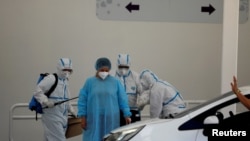Some poorer countries, alarmed at watching rich countries receiving millions of COVID-19 vaccines, are deciding not to wait for vaccines from the World Health Organization and other groups, and have, instead, started striking their own vaccine deals.
Juan Carlos Sikaffy, president of the Honduran Private Business Council, told the Associated Press that Honduras “cannot wait on bureaucratic processes or misguided decisions” to give citizens “the peace of mind” offered by the COVID-19 vaccine.
The Honduran Private Business Council participated in a vaccine-buying deal for the Central American country by providing a bank guarantee.
Serbia has also gone to the vaccine market even though it has already paid 4 million euros to WHO’s COVAX program, created to distribute the COVID vaccines fairly.
Serbian President Aleksandar Vucic said he could not wait for COVAX after watching rich countries buy up so many of the precious shots.
“It’s as if they intend to vaccinate all their cats and dogs,” he said.
The head of the World Health Organization called Friday for pharmaceutical companies to share manufacturing facilities to increase the production of COVID-19 vaccines.
Speaking at an online news briefing from Geneva, Tedros Adhanom Ghebreyesus said what is needed is “a massive scale-up in production.”
He noted that France’s pharmaceutical company Sanofi announced it would make its manufacturing infrastructure available to support production of the Pfizer/BioNTech vaccine and called on other companies to do the same.
“We encourage all manufacturers to share their data and technology to ensure global, equitable access to vaccines.”
He also repeated his call for rich nations to share doses with poorer countries once they have vaccinated health workers and older people.
Tedros said 75% of all COVID-19 vaccinations worldwide have been given in just 10 countries, while nearly 130 nations have not given a single vaccination.
“The longer it takes to vaccinate those most at risk everywhere, the more opportunity we give the virus to mutate and evade vaccines,” said Tedros said, adding that unless the virus is suppressed everywhere, it could resurge globally.
China's Sinovac Biotech said Friday that late-stage trial data of its COVID-19 vaccine from Brazil and Turkey showed the vaccine prevented hospitalization and death in COVID-19 patients in 100% of participants, but said it was only 50.65% effective at keeping people from getting infected.
The trial of Sinovac’s CoronaVac vaccine involved nearly 12,400 people and also found the vaccine was 83.7% effective in preventing COVID-19 cases that required any medical treatment.
In the United States, President Joe Biden's administration announced Friday that the Pentagon had approved the deployment of 1,100 active-duty troops to assist with COVID-19 vaccination efforts. It said that number will likely rise soon.
Yankee Stadium was transformed Friday into a COVID-19 vaccination hub. The iconic stadium is located in the Bronx, a mostly Black and Hispanic New York City borough that has experienced high infection and death rates from the coronavirus.
Currently, only Bronx residents are eligible to receive the COVID shots at the stadium where members of the National Guard have been deployed to assist in the vaccine campaign.
Jacqueline Soto, a 55-year-old school secretary from the Bronx, told Reuters Friday “I was on a wait list for three weeks, desperate to get a vaccine ... I was unsuccessful. But today I’m here. I just went on the link yesterday and already I got the appointment today and I’m happy to be here.”
The U.S. supermarket chain Kroger said Friday it would give $100 to workers who get a COVID-19 vaccination, joining a growing number of companies who are incentivizing employees to get vaccinated.
Coronavirus cases in the United States have been decreasing in recent weeks. However, medical officials are urging U.S. residents to not turn Sunday’s Super Bowl, a yearly football game, into a superspreader event. Fans usually gather at large home parties or in bars and restaurants to watch the game on television. Medical authorities this year, however, are urging football fans to watch the game “with the people you live with.”
Greece has announced stricter lockdown restrictions in the capital, Athens, as well as other parts of the country to stop the spread of the pandemic. The restrictions include a curfew that will start at 6:00 pm Saturday.
Also Saturday, South Korea begins easing its restrictions on businesses outside of the capital, allowing them to stay open an additional hour to 10 p.m. Small business owners and self-employed people have been calling for an easing of restrictions imposed as the country seeks to control the coronavirus outbreak. However, business in Seoul, the capital, will still close at 9 p.m.
There are more than 105 million global GOVID-19 cases and 2.3 million deaths from the coronavirus, according to the Johns Hopkins Coronavirus Resource Center.
The United States remains at the top of the list as the location with the most infections, with more than 26.8 million cases, followed by India with 10.8 million and Brazil with 9.4 million.








